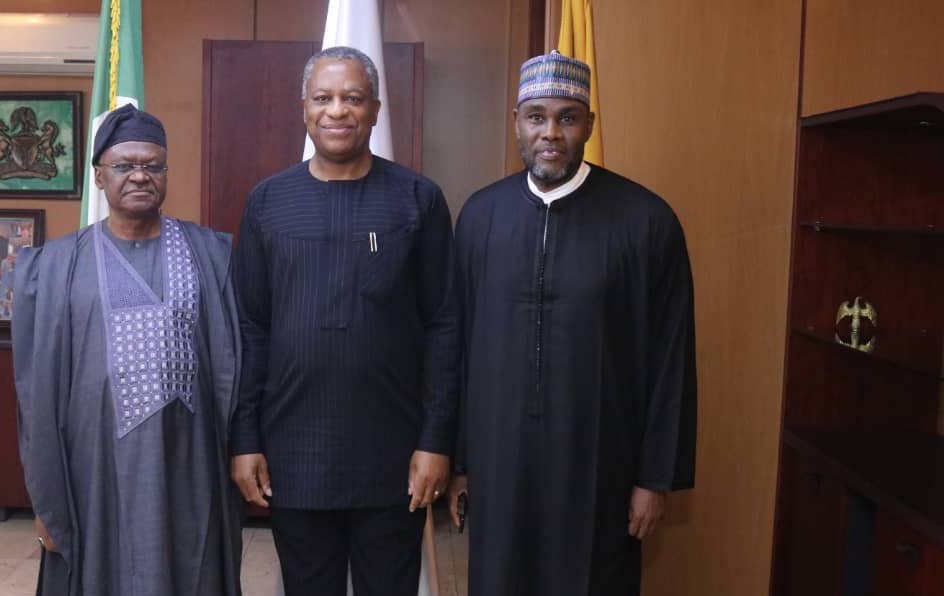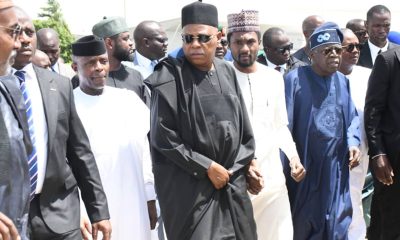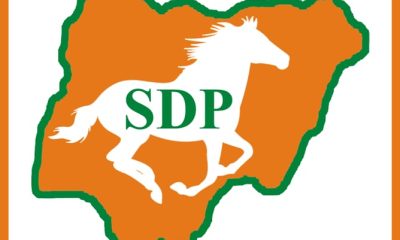COVER
US Imposes New Visa Charges on Nigerians

The United States of America (USA) has announced that it is imposing a ‘reciprocity fee’ on Nigerians seeking to travel to the United States. The new fee will only apply to Nigerians whose visa request has been approved.
The announcement was made in a statement by the U.
S. Embassy in Abuja on Tuesday. The new fee ranges from $80 to $110 (28, 8000 to N39, 600) depending on the type of visa being applied for.“The reciprocity fee will be charged in addition to the nonimmigrant visa application fee, also known as the MRV fee, which all applicants pay at the time of application,” the embassy said.
The embassy added that the fee was being imposed to reciprocate a similar one by the Nigerian government on Americans seeking to travel to Nigeria.
“U.S. law requires U.S. visa fees and validity periods to be based on the treatment afforded to U.S. citizens by foreign governments, insofar as possible.”
The U.S. is a major destination for thousands of Nigerians who travel annually for various reasons including education, leisure, and work.
Part of the statement read: “Effective worldwide on 29 August, Nigerian citizens will be required to pay a visa issuance fee, or reciprocity fee, for all approved applications for nonimmigrant visas in B, F, H1B, I, L, and R visa classifications. The reciprocity fee will be charged in addition to the nonimmigrant visa application fee, also known as the MRV fee, which all applicants pay at the time of application. Nigerian citizens whose applications for a nonimmigrant visa are denied will not be charged the new reciprocity fee. Both reciprocity and MRV fees are non-refundable, and their amounts vary based on visa classification.
“U.S. law requires U.S. visa fees and validity periods to be based on the treatment afforded to U.S. citizens by foreign governments, insofar as possible. Visa issuance fees are implemented under the principle of reciprocity: when a foreign government imposes additional visa fees on U.S. citizens, the United States will impose reciprocal fees on citizens of that country for similar types of visas. Nationals of a number of countries worldwide are currently required to pay this type of fee after their nonimmigrant visa application is approved.
“The total cost for a U.S. citizen to obtain a visa to Nigeria is currently higher than the total cost for a Nigerian to obtain a comparable visa to the United States. The new reciprocity fee for Nigerian citizens is meant to eliminate that cost difference.
“Since early 2018, the U.S. government has engaged the Nigerian government to request that the Nigerian government change the fees charged to U.S. citizens for certain visa categories. After eighteen months of review and consultations, the government of Nigeria has not changed its fee structure for U.S. citizen visa applicants, requiring the U.S. Department of State to enact new reciprocity fees in accordance with our visa laws.”
“The reciprocity fee will be required for all Nigerian citizens worldwide, regardless of where they are applying for a nonimmigrant visa to the United States. The reciprocity fee is required for each visa that is issued, which means both adults and minors whose visa applications are approved will be charged the reciprocity fee. The fee can only be paid at the U.S. Embassy or the U.S. Consulate General. The reciprocity fee cannot be paid at banks or any other location.”
COVER
FG Approves Mandatory Drug Integrity Test for Tertiary Students

By Attah Ede, Makurdi
In a bold move to tackle the growing menace of drug abuse among young people, the Minister of Education, Dr. Tunji Alausa, has approved the implementation of mandatory drug integrity testing for students in Nigeria’s tertiary institutions.This initiative, announced after a strategic meeting with the Chairman of the National Drug Law Enforcement Agency (NDLEA), Brig.
Gen. Buba Marwa (retd), will apply to both new and returning students through compulsory and random testing.The development is part of a comprehensive three-pronged strategy proposed by the NDLEA, which includes curriculum reform to introduce up-to-date drug education in schools, stand-alone drug abuse prevention programs at the secondary level, and a national student drug testing policy.According to NDLEA spokesman, Femi Babafemi, over 40,000 drug offenders have been arrested and more than 5,500 metric tonnes of narcotics seized in the last two years alone.Marwa emphasized the urgent need for this initiative, stating that drug use fuels criminal activities including terrorism, kidnapping, and banditry.“We are fighting for the souls of our children. Without drugs, many criminal activities would not be possible,” Marwa declared.Dr. Alausa acknowledged the devastating effects of drug abuse on academic performance and employability, describing it as a major threat to national development.“When youths get into drugs, they lose interest in education. Even if they attend school, they’re not functional. Their ability to make informed life decisions is diminished, making them unemployable,” Alausa warned.To institutionalize the reforms, the minister announced the establishment of a Substance Use Prevention Unit in the ministry and the formation of an inter-ministerial working group with the NDLEA. He also committed to collaborating with the Universal Basic Education Commission and the Tertiary Education Trust Fund to support the NDLEA Academy in Jos.Meanwhile, in Makurdi, Benue State, a different kind of crisis is unfolding. No fewer than 76 nursing students at the Benue State University (BSU) were forcefully evicted from their hostels on Thursday, following a dispute over increased accommodation fees.The students, who were relocated from the main campus to the dilapidated facilities of the former School of Nursing and Midwifery, said they were asked to pay N30,000 per bed space, double the N15,000 charged at the main hostels.According to them, the eviction came without prior notice, even as the students were in the middle of their first semester exams and preparing for their clinical postings slated for August 11.Many of them, coming from distant states such as Lagos, Kaduna, and Abuja, were left stranded on the streets with their luggage and no alternative accommodation.Acting President of the Benue Schools of Nursing and Midwifery Alumni Association and media aide to the State NANNM Chairman, Mhange Moses, condemned the action as harsh and insensitive.“This is a shameful treatment. These students live in appalling conditions — no water, no electricity, broken toilets. Now they are being thrown out with no place to go. The nursing college is at risk of losing accreditation, and the students’ futures are in jeopardy,” Moses lamented.He appealed to Governor Hyacinth Alia to intervene urgently and provide a safe and conducive learning environment.“Nurses are the custodians of public health. They deserve better. We appreciate the governor’s efforts in upgrading the institution, but he must act now to prevent further damage,” Moses urged.As the federal government ramps up its fight against drug abuse in tertiary institutions, the plight of these nursing students highlights another pressing issue in the education sector—access to basic, dignified living conditions while pursuing academic and professional training.COVER
FCMB Group Records N529.2bn in Half Year Gross Earnings

By Tony Obiechina, Abuja
FCMB Group Plc has announced its financial results for the half-year period ended June 30, 2025, recording gross earnings of N529.2bn, representing a 41.3 percent increase compared to N374.5bn posted in the corresponding period of 2024.In its unaudited financial statements for the period ended March 31, 2025, and filed with the Nigerian Exchange Limited on Tuesday, the growth was primarily driven by a 70.
3 percent surge in interest and discount income, which rose to N458. 4bn from N269.2bn in H1 2024. This strong performance reflects improved yields on earning assets and expansion in the Group’s loan book, which reached N2.38tn as of 30 June 2025.Net interest income climbed to N207.4bn, up 95.3 percent from N106.2bn in the same period last year. Despite this, interest expense rose by 54.1 percent to N251.0bn, compared to N163.0bn in 2024.Net fee and commission income also rose significantly by 51.3 percent to N37.9bn from N25.1bn. This growth was aided by a 30.9 per cent rise in fee and commission income to N47.4bn, even as fee and commission expenses fell by 14.9 per cent to N9.5bn.However, net trading income declined by 29.3 per cent to N22.2bn from N31.4bn, while other gains fell sharply to N696.3m from N37.1bn, reflecting lower revaluation and disposal gains on financial instruments.Operating expenses increased across the board. Personnel expenses rose 34.4 percent to N48.3bn, and depreciation and amortisation grew 24.8 per cent to N8.1bn, while general and administrative expenses jumped 59.4 per cent to N57.2bn. Other operating expenses rose 49.4 per cent to N39.6bn.Despite these cost increases, the Group delivered a profit before tax of N79.1bn, a 23.2 per cent rise from N64.2bn in H1 2024. After tax, profit stood at N73.4bn, reflecting a 23.4 per cent year-on-year growth from N59.5bn.Other comprehensive income for the period was N6.9bn, up from N24.8bn in the previous year. This brings total comprehensive income for the Group to N80.3bn for H1 2025, slightly below the N84.3bn reported in H1 2024, due largely to lower unrealised gains from foreign currency translation differences.Total assets as of June 30, 2025, stood at N7.54tn. Customer deposits rose 39.9 per cent to N4.54tn, while loans and advances to customers increased modestly to N2.38tn.COVER
NNPCL Backstraps, Rules Out Port Harcourt Refinery Sale

By David Torough, Abuja
The Nigerian National Petroleum Company Limited (NNPCL) has officially ruled out the sale of the Port Harcourt Refining Company, reaffirming its commitment to completing high-grade rehabilitation and retention of the plant.Group Chief Executive Officer of NNPC Ltd, Bayo Ojulari, made the announcement during a company-wide town hall meeting at the NNPC Towers in Abuja, ending weeks of speculation over the future of the country’s most prominent state-owned refining asset.
A statement by the company management yesterday said, “The Nigerian National Petroleum Company Limited has officially ruled out the sale of the Port Harcourt Refining Company, reaffirming its commitment to completing high-grade rehabilitation and retention of the plant.”He described selling the Port Harcourt Refining Company as “ill-advised and sub-commercial.”Ojulari’s remarks come amid rising public concern sparked by his earlier comments at the 2025 OPEC Seminar in Vienna, where he said “all options are on the table” regarding the future of Nigeria’s refineries.The statement triggered a wave of speculation that a sale might be imminent.He stated that the new position of the firm was not a shift. Rather, it is informed by ongoing detailed technical and financial reviews of the Port Harcourt, Kaduna and Warri refineries.The statement added, “The ongoing review indicates that the earlier decision to operate the Port Harcourt refinery, before full completion of its rehabilitation, was ill-informed and sub-commercial.”Although progress is being made on all three, the emerging outlook calls for more advanced technical partnerships to complete and high-grade the rehabilitation of the Port Harcourt refinery.”Thus, selling is highly unlikely as it would lead to further value erosion.”At the town hall, the Executive Vice Presidents presented progress reports from the Upstream, Downstream, Finance, Business Services, Gas, Power, and New Energy businesses, highlighting operational achievements, ongoing reforms, and areas requiring attention.According to the statement, the announcement reinforces NNPC’s mandate as a strategic custodian of national energy infrastructure and reflects a firm resolve to deliver on the complete rehabilitation and long-term viability of Nigeria’s refineries.It also signals continuity in the Federal Government’s broader energy security objectives and a commitment to retaining critical assets under national control.Feedback during and after the session revealed a workforce energised and aligned with the leadership’s vision. Described as “reassuring,” “transformational,” and “sustainable”, the atmosphere reflected an optimistic outlook among employees and hopefulness about the company’s evolving strategic direction.“NNPC Ltd will continue to reposition itself as a commercially driven, professionally managed national energy company, grounded in transparency, focused on performance, and unwavering in its responsibility to its number one stakeholder group, Nigerians,” Ojulari concluded.The statement added that the declaration was received with applause from hundreds of staff attendees, who described the position as a renewed sense of business-focused direction across the organisation.NNPCL Drills Four Oil Wells in Kolmani, BauchiA Director at the Nigerian National Petroleum Company Ltd, Yusuf Usman, said the company has drilled four oil wells in the Kolmani area of Bauchi State.He also restated the commitment of the company to the exploration and development of oil and gas resources in the northern region of the country.Usman said this on Wednesday in Kaduna at the Sir Ahmadu Bello Memorial Foundation’s two-day interactive Session on Government-Citizens Engagement.Usman stated, “So far, the NNPCL has drilled four wells in the Kolmani area of Bauchi State, and is currently evaluating the appropriate technology to be deployed for the next phase of drilling operations.“In support of President Tinubu’s Compressed Natural Gas (CNG) Initiative, five CNG and Liquefied Natural Gas (LNG) plants are under construction in Kogi.“These plants are expected to enhance gas supply and accessibility across the northern region.”Usman highlighted some of the achievements of the company under the Tinubu-led administration that benefited the north and other parts of the country.































1 Comment